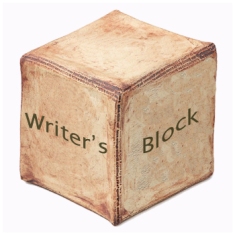
Writer’s Block
 When words abandon a writer, it can feel catastrophic. But, it happens to all of us—the professional and the amateur, the published and the unpublished, the new and the seasoned. The question is how do we treat this most devastating of writing ailments?
When words abandon a writer, it can feel catastrophic. But, it happens to all of us—the professional and the amateur, the published and the unpublished, the new and the seasoned. The question is how do we treat this most devastating of writing ailments?
Firstly, we must establish that writer’s block exists. There is some controversy over this. According to Anne Lamott, writer’s block is a “definite, not a maybe.” She believes in it for the best possible reason—personal experience. I’m of a mind to close the argument here. If you haven’t experienced Writer’s Block, then this post isn’t for you. Everyone else, stay tuned.
There are those who view “Writer’s Block” as a misnomer, though. John Rogers states succinctly, “you can’t think yourself out of a writing block; you have to write yourself out of a thinking block.” And then there’s Jeffrey Deaver, who says, “there’s no such thing as writer’s block; the problem is idea block. When I find myself frozen[. . .]it’s usually because I’m trying to shoehorn an idea into the passage or story where it has no place.”
I’m partial to these Idea Block explanations, but I don’t think they cover every possible cause of writer’s block. It’s true that sometimes we get stuck because we’re headed in the wrong direction. But sometimes we get stuck because we’re afraid, burned-out or disconnected.
But, I’m more interested in the solution than delineating the causes of Writer’s Block. What can we do about it? How do we prevent it, treat it, and recover from it?
Here, I stand on the shoulders of giants. The two most dear to my heart are Steven Pressfield, author of The War of Art, and Julia Cameron, author of the classic The Artist’s Way. Each in their own way, these writers handed me the tools to understand and combat my own Writer’s Block—in all its many changing iterations. I will not do justice to either of their far-reaching wisdom on this subject, so I strongly encourage you to pick up their books for yourself.
These two greats share one basic piece of advice for combatting Writer’s Block: write every day. Steven Pressfield calls this “Turning Pro”—viewing our writing as a duty, showing up and punching the clock in front of our laptops everyday, no matter what our circumstances are. Pressfield admits that Turning Pro will cause us to meet with great Resistance—which he defines as an impersonal force in the universe that moves against any creative endeavor. But, Turning Pro is the antidote to Resistance. It creates the conditions for facing and transcending our fears. And all forms of Writer’s Block—boredom, frustration, fatigue, etc—are just Fear in its many disguises.
Cameron gives the same advice as part of her tool kit for overcoming Writer’s Block, only she uses different terminology. Cameron tasks aspiring creatives to write Morning Pages—three long-hand, free-form pages, every day. Writing Morning Pages clears the junk out of your brain. It puts you in daily contact with your subconscious. It teaches you to “rest on the page.” In other words, you learn to produce work no matter the circumstances. Even if that work is terrible and only a means to writing the real thing you want to write. Even if you throw it away and no one ever sees it. You write every day.
Cameron couples this task of Morning Pages with two more tasks to combat the dreaded Writer’s Block. One she terms Artist’s Dates—weekly solo excursions in the name of play. Take yourself to a movie, a park, a fabric store, a new part of town. . . whatever. Just feed your senses. Once a week. No companions and no agendas. This gives your brain new raw material and trains the mind to pay attention to the world deeply.
Lastly, she promotes walking as a means of combatting Writer’s Block. If all else fails and you are blocked, take a walk. The physical movement will shift your thinking brain off and your intuitive brain on, and the ideas can suddenly reach you again.
I have used all of these methods to maintain a steady level of productivity in my writing for the last year. I subscribe to them all. There is much to be said for small acts of perseverance.
I leave you with this quote from Goethe, “Whatever you think you can do or believe you can do, begin it. Action has magic, grace and power in it.” The power to dissolve Writer’s Block, no less.